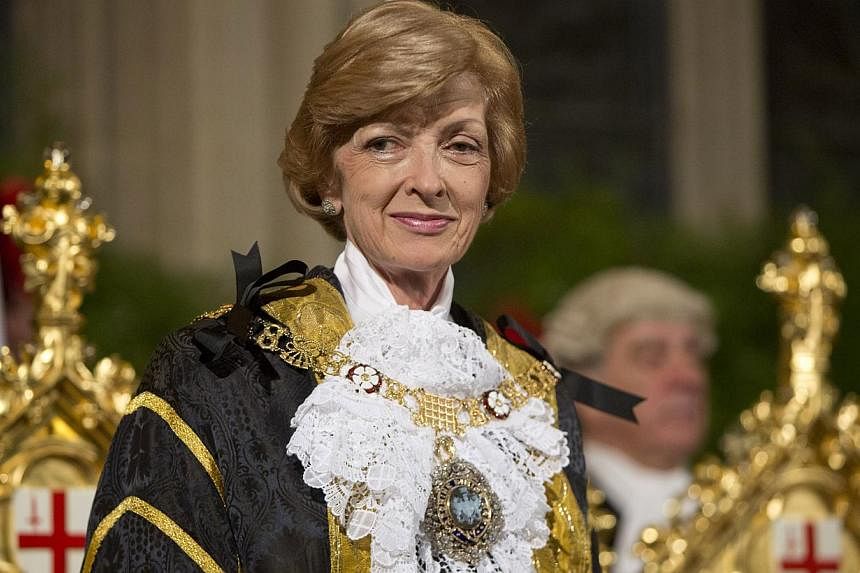LONDON (REUTERS) - A major public inquiry into the British state's failure to stop decades of child sex abuse, and whether political figures tried to cover it up, was in chaos on Friday after the second head of the investigation quit before it has even started work.
The decision by Fiona Woolf, the Lord Mayor of the City of London, to step down is a major embarrassment for Prime Minister David Cameron's government which has promised the inquiry will leave "no stone unturned" to find the truth about widespread claims of organised sex abuse.
Critics had said Woolf had no qualifications for the role and was too close to a former government minister likely to be an important witness at the inquiry for victims to have any confidence in her.
"Sadly, it's become clear that the inquiry as chaired by me will not have widespread victim support - and I am particularly sensitive to the views of victims," Woolf said in a statement.
"As their needs must be paramount, I have decided to stand aside so that this important work can proceed without the obstacle of negative speculation and comment."
Home Secretary Theresa May ordered the inquiry, expected to last for years, in July in response to a growing clamour from victims that the authorities had failed to act over child abuse allegations for years.
It also followed a number of high-profile cases such as those of BBC TV presenter Jimmy Savile, who abused hundreds of victims for decades, and accusations about Cyril Smith, a former lawmaker in north-west England, both of whom are now dead.
The wide-ranging investigation will look at whether ministers, parliament, police, councils, churches and schools among others failed to identify and protect child children from child abuse from 1970 up to the present day.
But since its launch, the inquiry has been dogged by criticism and accusations from victims that it would not examine claims politicians and public figures were involved in cover-ups, and that some were even involved in the abuse themselves.
In July, judge Baroness Elizabeth Butler-Sloss stood down as head of the inquiry just days after her appointment by May because her late brother was Attorney-General, the government's chief legal adviser, in the 1980s when some of the abuse cases are alleged to have taken place.
Two months later May selected Woolf, 66, a lawyer and energy market expert who has advised several governments and the World Bank on privatisation and energy reforms, as her replacement.
But her position came into question when it was disclosed she had social links to Leon Brittan who was home secretary in the government of Margaret Thatcher in the 1980s.
As a minister, Brittan was handed a dossier about an alleged paedophile ring in establishment circles, which he says he dealt with correctly.
But the Home Office's top civil servant said in July that more than 100 "potentially relevant" files had gone missing.
Despite Cameron's backing, Woolf quit on Friday as the inquiry chairman after it was revealed a letter detailing her relationship to Brittan and his wife had been re-drafted seven times with assistance from Home Office officials.
Campaign groups, who met officials on Friday to discuss the inquiry, had said her position was untenable and victims had refused to work with her.
They have called for the whole set-up of the review to be sent back to the drawing board.
"It would be a dead duck in the water as far as we we're concerned if Mrs Woolf remained," Peter Saunders, chief executive of the National Association for People Abused in Childhood, told reporters before the resignation announcement.
"Most survivors of abuse have waited a long, long time to get a voice and they're more than happy to wait a little bit longer to make the whole thing work rather than steam ahead with... the sort of wishy-washy terms of reference we've got at the moment."
Keith Vaz, chairman of parliament's Home Affairs committee, described the chairman's appointment process as "chaotic".
"Somebody needs to take a grip of this process so that the victims who should be at the centre of these proceedings ought to feel that they are able to have great confidence and faith in what is going on," he told Sky News.

